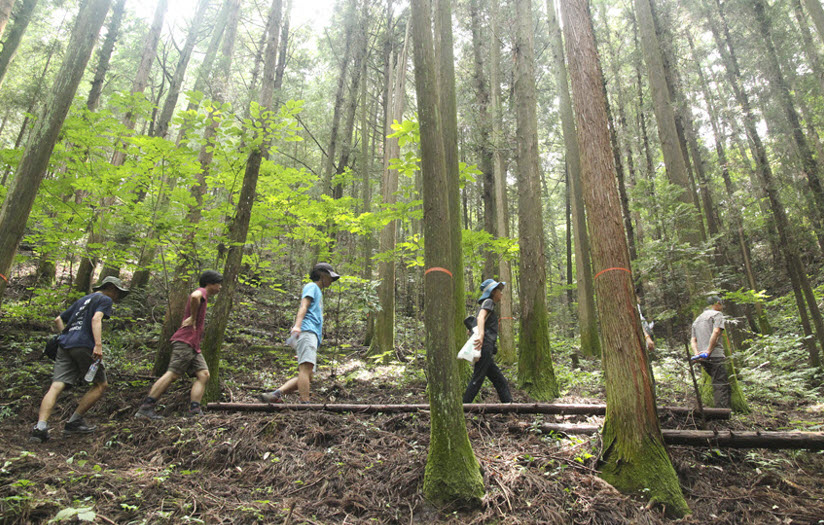With the spread of COVID-19, the restrictions put on indoor activities have led to the rise of various recreational activities that can be enjoyed outdoors. Many people love hiking, through which one can enjoy nature to its full extent on one’s own. SNU Forests (SNUF) of the College of Agriculture and Life Sciences is a place that offers such an experience to members of the university community, and its role as a research space to preserve the ecosystem is becoming more important with the outbreak of COVID-19.

The field education in the SNUF (picture provided by SNUF)
Growing alongside the history of SNU
After the establishment of the 1913 experimental plantation in Suwon, SNUF has served as the site for long-term as well as experimental research in fields that are crucial to the advancement of forest science, such as forest ecosystem, hydrology, forestation, or forest engineering. Professor Park, Pil Sun (department of Forest Sciences), the head of SNUF, and assistant Kim Yu Mi have spoken about the significance of the forests. “Instead of focusing on the economic use of forest resources, we are managing the forest for the purpose of education, research, preservation of ecosystems, and recognizing it as the habitat of various organisms,” they said.
SNUF is composed of its headquarters, which is in charge of the campus landscape and overall work, and three provincial forests: Nambu University Forest, Taehwasan University Forest and Chilbosan University Forest. The oldest is Nambu University Forest in Gwangyang, Jeollanam-do, which stretches from the Agosan area of Jirisan and Baegunsan to the southern coast. It is home to various climate zones and is the site of active research on water and landslides. Taehwasan University Forest is the closest to Gwanak campus, making it easy to visit for field research. In Taehwasan the artificial afforestation area of the gentle-sloped valley, home to deciduous and pine trees, coexists with the natural forests of the highlands, home to oak and ash trees. The Chilbosan University Forest in Suwon-si, Gyeonggi-do produces seedlings for greening and urban landscaping, and also supplies them to the three campuses of Seoul National University as landscaping trees. The main types of seedlings are zelkova, bamboo, and Bokjaji, and more than a hundred other landscaping trees are cultivated and managed for tests and research.
A forest open to anyone
The Forests are an active site of research and education for SNU members and the general public. Practices for major classes of the department of Forest Environmental Sciences at the College of Agriculture and Life Sciences are held in the forests, as well as practices for various colleges such as that of Natural Sciences, Education, and Pharmacy. The most representative case would be the practice for ‘Forest Ecology’ class, where students climb the Banyabong Peak from the Nogodan Peak, and descend to the nearby village, passing through Imgeolyeong and Piagol, observing the changes in vegetation according to altitude. One graduate (Department of Forest Sciences, ‘14) who took this class in the first semester of 2020, gave his impression. “In my major, there are things I can’t learn without hands-on experience, like how to plant seedlings or how to graft a chestnut branch. In the forests, I felt these abstract theories becoming living knowledge through direct experience,” he said.
The facilities of the Forests are open not only to majoring students and researchers, but also to university members and visitors. You can reserve lodgings and seminar rooms at Taehwasan and Baegunsan for visiting or research purposes on the SNUF website (uf.snu.ac.kr). At the moment, the number of guests is being restricted according to COVID-19 social distancing guidelines for the forests’ respective regions, and disinfection is being carried out after guests leave. “Recently, in response to the changing demands of society, we are thinking of ways to discover various forest values and coexist with local people, by developing various programs such as forest experience education or a forestry specialist curriculum,” Professor Park said. SNU Forests will continue to explore the endless potential of forests.
Source: https://www.snu.ac.kr/snunow/snu_story?md=v&bbsidx=132999
Written by Minjoo Lee, SNU English Editor, mjl1018@snu.ac.kr
Reviewed by Professor Travis Smith, Department of Asian Languages and Civilizations, tlsmith@snu.ac.kr

